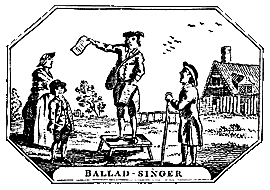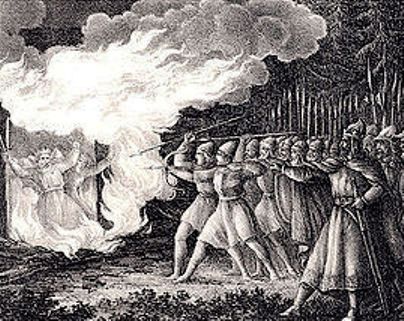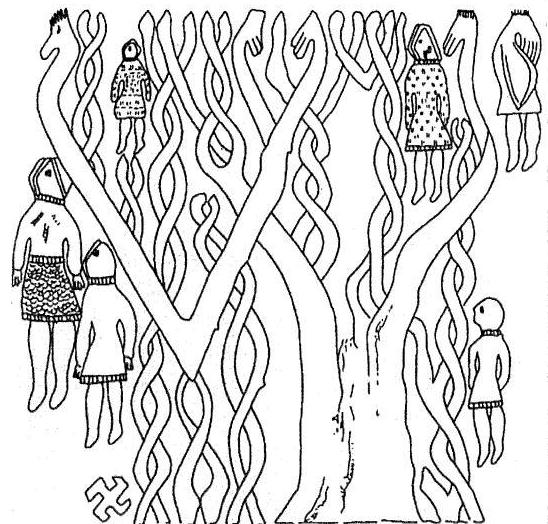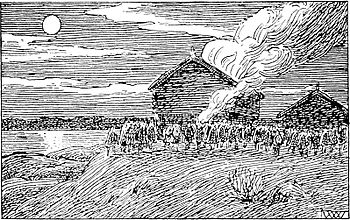
Stolt Herr Alf
The Ballad of Proud Lord Alf
from Ancient Swedish Ballads, Svenska Fornsånger, Vol. I
[Germanic Mythology][Fornaldarsögur Nordurlanda] [Medieval Scandinavian Ballads]

The First English Translation
© 2015 Mark Puryear
"Stolt Herr Alf" ("Proud Lord Alf") is a Medieval Swedish Ballad first recorded in the 15th century, clearly heathen in tone. The song exploits a popular theme: a king and his warband asleep in a hall are ambushed and murdered by a rival. The ballad’s theme is blood revenge. Its popularity and possible path of transmission are linked to the Faroese Island ballads of Alvur Kongur (“King Alf”) and the Icelandic Fornaldarsaga Hálfs Saga ok Hálfsrekka.
Two different, but almost identically-worded manuscripts of this ballad dating from the 17th century are now held in the Royal Swedish Library. These two versions were recorded from several performances by ballad singer Ingierd Gunnarsdotter (b. 1602-2) and appear in the ballad collection known as NGW (Någre gamble Wijser). Recorded between 1679-81 near Lyrestad, 15 km NE of Mariestad in East Scandinavia, the dialectal verbiage of the recordings indicates that they both hail from southwestern Scandinavia. The names Sigurder and Torgnejer, with their nominative –er endings in particular, exhibit an apparent West Nordic influence on the ballad.
That the Swedish versions appear before all printed versions of the relevant material in Icelandic and Faroese demonstrates that the popular printed texts of the 1700s were not the source of transmission. The ballad was well established in Scandinavia by the 1700s. The Faroese group of Alvur Kongur songs were collected from 1780 to the 1880s from a range of singers, and on occasion yield distinct variants. Arguments have been made for both eastern to western transmission as well as from a route from west to east. Despite how few remains are preserved in Sweden for comparison, many scholars believe that the legend is not of Swedish origin. The fullest account of the story occurs in the Icelandic Halfs saga ok Halfsrekka [ Half and his Heroes, chapters 10-13].

Adolf Arwidsson
Mark Puryear
1. Vpp så vacknade Allfwens frw,
Hon tahlade til sin bonde:
"Jagh haar drömbt så ynkelig dröm,
"Gudh gee den 2)
blihr ingen til onde."
Du lått 3)
honom sörja som fången ligger vnder heeda.
1. So awoke Alfven’s wife,
She spoke to her husband:
“I have dreamt a terrible dream,
“God grant that it does not come to evil.”
a)
You let him grieve who lies captive under the heath.b)
2) OM. gef’ han.
3) OM. läth. — Äfven OM. har, utom i de två första verserna, dels lätt, och dels läth.
(Also in the other mss, but in the two first verses, partially lätt and partially läth.)
[a] "God grant...", perhaps an indicator that Lord Alf, here Alfven's, wife is Christian.
[b] The one "who lies captive under the heath" i.e. below ground, a dead man— perhaps with a subtle reference to his heathen faith. His identity is not made clear. Why would he grieve? Perhaps because his death has not yet been avenged. In that case, the function of the refrain is to stress the holy duty of vengeance— the implicit meaning being: “You make the dead man grieve, as long as you do not avenge him.” If so, the song is didactic, and the repeated refrain serves to emphasize the principle that it is the duty of a Lord’s “best men” (yppersta svenner) to avenge him. On that note, the ballad ends with a clearly stated vow by Lord Alf's best men to avenge his murder.
"Vpmuradt medh tegel och steen,
"Där inne brann du stolt Herr Alf,
"Medh giefvaste dine svener." —
Tu lått honom sörja som fången ligger vnder heeda.
Walled with brick and stone,
You were burned therein proud Lord Alf,
with the best of your men.”—
You let him grieve who lies captive under the heath.
3. "Tu ligg och soff min hiertans kier,
"Och tagh inga drömmer til giömma,"
J morgon skäl jagh rijda j min faders gård,
"Medh mine ypperste svena". —
Tu läth honom &c.
3. “Lie (down) and sleep my heart's beloved,
And take no dreams to bear;
Tomorrow I ride to my father’s estate
With my finest men.”
You let him grieve who lies captive under the heath.
4. "Assmund heter konungen,
"Kieraste fadren min,
"Så gierna spörjer han dödan tigh,
"Som fången10) i gården sin." —
4. “Asmund hight the king c)
My beloved father
He’d like to hear that you are dead
who is [...captive...] d) in his court.”—
[d] According to the editor, both versions are defective here; fången has been added.
Han rijder i konungens gård,
Vthe Assmund konungen
Sielf för honom ståer.
He rode into the king’s estate,
Then King Asmund
himself stood before him.
6. "Statt här Assmund konung böld,
"Kiere Svären min!
"Vill tu låhna mig hwss i natt,
"Medh giöfvaste svener min?" —
6. “Here stands Asmund the mighty king:
My dear father-in-law!
Will you loan me a house tonight
With my best men?”
7. "Mitt vppå min Apellgård
"Där ståer så vähl bygd en stufva,
"Där inne solf herr Stolten Alff,
"Medh dine giefvaste svener."
7. “Within my apple-orchard
There lies so well built a room
Where you may rest Proud Lord Alf,
With your best men.”
8. "Hielp nu Oden Asagrim,
"Jagh tränger nu til tig kalla,
"At jagh må vinna Herr stolten16) Alf,
"At jagh blihr vtan skade"17). —
8. “Help now Odin Leader of the Æsir,e)
I have need to call upon you now,
That I may defeat the proud Lord Alf,
That I may do so without injury.”
17) literally scathe; OM. fahra. harm,
9. "Du skalt settja stång för dorr
"Och eldh j alle gafler,
"Så kan tu vinna stolten Herr16) AlfF
"Och blifva vtan fahra." —
9. “You shall set a bar before the door,
And fire in every gable,
Thus you can defeat the proud Lord Alf,
And do so without being harmed.”
Han slogh så stort et slagh,
Däth vacknade Kongen i lofftet logh,
Och drottningen i sin sahl.
He struck so great a blow,
It woke the king in his room upstairs,
And the queen in her hall.
Han hade otta händer:
"Gafhler och vägger slå vj nedh,
"Och springa vth alle i sänder."
He had eight hands:
“Gables and walls, we shall beat down
And jump out all in turn.”
"Och bränna22) hans gård i rötter,
"Han23) haar förgjordt vår herre i dagh,
"Dertil få vj inge böter."
Du lätt honom sörja som fången ligger vnder heeda.
And burn his estate to the ground; g)
He who has killed our lord today,
For this we got no recompense.”
You let him grieve who lies captive under the heath.
23) OM. som.
Anmärkn.: Vers. 12 åsyftar en, i det gamla Norden, först genom uråldrig sedvana helgad och derefter äfven i lag stadgad rättighet, att, i vissa fall, för mördad person erhålla böter; eller den närmaste anhöriges skyldighet att hämnas hans död uppå banemannen, i händelse denne nekade erlägga böterna.
[g] literally "burn his estate to the roots."
Note: Verse 12 refers to a right in the old Nordic countries, at first sacred through age-old custom and then afterwards also set down in law, that, in some cases, a fine could be demanded for a murdered person; otherwise it was duty of the nearest kinsman to avenge his death upon the killer in the event he refused to pay the fine (wergild).

Drawing from the Oseberg Tapestry c. 840 AD
Synopsis: As the ballad begins, Lord Alf's wife wakes from troubled sleep. She tells her husband of a dream in which she saw him and his retinue burnt alive in a house on her father's estate. Lord Alf comforts his wife, tells her to go back to sleep and think nothing more of it.
The next day he rides with his retinue to his father-in-law, King Asmund's estate, where he requests lodging for himself and his men for the night. Asmund provides them with a sturdy house in his orchard, then secretly invokes Odin for advice. Here called Oden Asagrim or Odin "Leader of the Æsir", the heathen god instructs Asmund to go at night and bar the door with Alf and his men inside and set the place ablaze. Only in this manner can he defeat Lord Alf without himself being harmed.
King Asmund does as Odin says. While the fire rages, two heroes rise and make themselves known. They are afforded one verse each. Some of Alf's men must survive the inferno. As the ballad concludes, his men vow vengeance against King Asmund for refusing to pay weregild for their Lord's murder. In the ballad's haunting refrain, the dead man grieves beneath the heath, thus far denied his revenge.
The story is told in brief allusions, suggesting that it was well-known to its intended audience. As with Eddaic poetry, a narrative oral tradition lies behind this tersely told tale. With that knowledge, we find a more detailed account of the events that unfold here in the Faroese ballad Alver Konung and in the Old Icelandic Fornaldarsaga Halfs ok Halfsrekkr / Half and his Heroes, chapters 10-13.

[Germanic Mythology: Fornaldarsögur Nordurlanda]